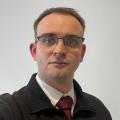
Earlier this month, Herefordshire doctor Malcolm Russell arrived in the city of Antakya, one of the cities worst affected by the powerful 7.8 earthquake that devastated parts of southern Turkey and Northern Syria.
The 77-strong UK-ISAR (International Search and Rescue) team of which Dr Russell is medical director, were immediately assigned a sector of the city and went straight into rescue after arriving on February 8.
OTHER NEWS:
- Ball bearing smashes through moving car's window in Herefordshire town
- These Herefordshire farmers have just had success at top industry awards
- Ofsted inspects Herefordshire school to check if it's still good
In a city where there is so much devastation you have to be selective about where you search operations, barely sleeping for the next two days.
The February 6 quake is now known to have killed more than 47,000 people.

Malcolm Russell has told of the challenges that faced rescuers in Turkey
“The first few days of an earthquake are always intense,” said Dr Russell, who has now attended four earthquakes – in New Zealand, Nepal and Japan.
“I have been involved in pre-hospital emergency medicine since the mid-90s and joined the ISAR team in early 2011, just before the Christchurch earthquake.”
The UK-International Search and Rescue team also includes four dogs and a vet: “The dogs are incredible,” said Dr Russell. “It’s said that dogs are worth 200 people, because they are trained specifically to identify live casualties.
Sign up for our free daily afternoon news briefing here and the day's top stories will be delivered straight to your inbox.
“In a city where there is so much devastation you have to be selective about where you search, and you can send search dogs over areas where people think they have heard someone. If they give a sign that someone is alive we focus on that area – and they’re never wrong.”
On arrival in Haytar province after the February 6 earthquake, Dr Russell tweeted “Honoured to be part of the @UK_ISAR_TEAM on its deployment to the Republic of Türkiye. Devastation, grief, hope – words that simply don’t capture it. Glad to help in some way and show that there are a lot of people out there who care.”
Dr Russell is a former Army doctor who, as well as his role with UK-ISAR, is chief executive officer of Prometheus Medical, based at Hope under Dinmore, near Leominster, a company whose aim is to equip and enable first responders at any level to preserve life in any environment.

Malcolm Russell, from Herefordshire, has been in Turkey
He is also a volunteer with MARS (Mercia Accident Rescue Service), providing emergency care at the site of accidents.
Five days after the 7.8 magnitude earthquake Dr Russell was involved in a rescue, about which he was interviewed by BBC News and he explained the enormity of the challenges facing rescue teams.
“I think it’s important to say that what you saw of me (on video) approaching the casualty was a small piece in a very big operation.The team worked in shifts. We worked absolutely flat out through the night ... making a small tunnel all the way down. We’d already removed one lady, and I was going just to check that the gentleman was OK. The operation was firstly, finding them, secondly freeing them because he was trapped by a concrete beam across his legs.”
OTHER NEWS:
- Hereford church set to be demolished to make way for care and nursing home
- Sir Bill will not accept "illegal migrants" being housed in Hereford hotel
- Parking charges on more Hereford streets will actually be good, chief argues
That rescue took a total of 20 hours, though others rescued were extricated more quickly. We first have to find a casualty and then find a route in to them that’s safe, and once you get to them they might be entombed. One man our team went to was actually trapped by a dead person under a concrete beam.
“We have rescued eight live casualties in our time here, one of whom was an elderly lady in her nineties who couldn’t get out of her flat.
“Every one of them is a quite amazing thing to be part of,” says Dr Russell. “I think it’s an extension of the area of medicine I’m very passionate about – trying to provide the very best of care to people in the worst of circumstances, to get them to hospital in the best possible condition.”



Comments: Our rules
We want our comments to be a lively and valuable part of our community - a place where readers can debate and engage with the most important local issues. The ability to comment on our stories is a privilege, not a right, however, and that privilege may be withdrawn if it is abused or misused.
Please report any comments that break our rules.
Read the rules here